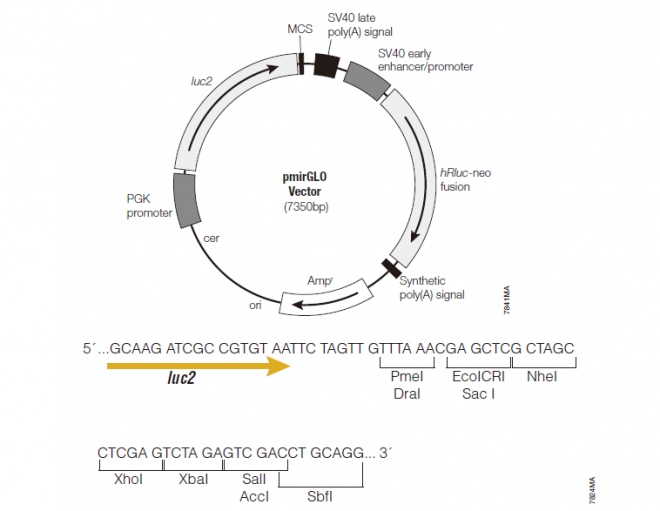| 质粒类型: | 双萤光素酶报告基因载体 |
|---|---|
| 克隆方法: | 多克隆位点,限制性内切酶 |
| 载体大小: | 7350 bp |
| 载体抗性: | Ampicillin (氨苄青霉素) |
| 产品编号 | 产品名称 | 规格 | 价格 |
|---|---|---|---|
| QC1439 | pmirGLO |
5ug质粒 |
¥1000.00 |

The pmirGLO Dual-Luciferase miRNA Target Expression Vector(a–d) is designed to quantitatively evaluate microRNA (miRNA) activity by the insertion of miRNA target sites 3´ of the firefly luciferase gene (luc2 ). These target sites can be introduced by cloning putative miRNA binding sites alone, or the 3´ untranslated region (UTR) of a gene of interest, to study the influence of these sites on transcript stability and activity. Firefly luciferase is the primary reporter gene; reduced firefly luciferase expression indicates the binding of endogenous or introduced miRNAs to the cloned miRNA target sequence. This vector is based on Promega dual-luciferase technology, with firefly luciferase (luc2 ) used as the primary reporter to monitor mRNA regulation and Renilla luciferase (hRluc-neo) acting as a control reporter for normalization and selection. This vector contains the following features:
- Human phosphoglycerate kinase (PGK) promoter provides low translational expression, which is advantageous when reduction of signal is the desired response. The PGK promoter is a nonviral universal promoter, which functions across cell lines (yeast, rat, mouse and human).
- Firefly luciferase reporter gene (luc2 ) inversely reports miRNA activity in mammalian cells.
- Multiple cloning site (MCS) is located 3´ of the firefly luciferase reporter gene (luc2 ).
- Humanized Renilla luciferase-neomycin resistance cassette (hRluc-neo) is used as a control reporter for normalization of gene expression and stable cell line selection.
- Ampr gene allows bacterial selection for vector amplification.
- SV40 late poly(A) signal sequence is positioned downstream of luc2 to provide efficient transcription termination and mRNA polyadenylation.
- Synthetic poly(A) signal/transcription stop site.


